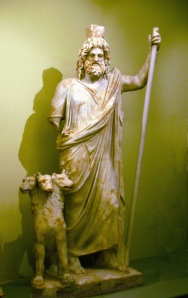Greek mythology has been around for a long time. Like vampires, samurai, and American Indians, the concept of it was around long before Hollywood or writers for teen novels could invent stories on the subject. But like those ideas and many ideas before or after them, the legendary tales of Ancient Greece were eventually picked up by those writers and producers to be made into books and movies. In the process, many of the stories that the Greeks had believed in centuries earlier were changed dramatically.
 Hercules, the famous warrior, would be made into the son of Hera – who had miraculously transformed from a spiteful, vengeful woman to a loving mother – instead of Alcmene; the Hydra (who was actually meant to be off being killed by said Hercules) would be guarding the Golden Fleece, and could be killed by one stab, rather than needing to have its heads lopped off one-by-one and then covered by firebrands; and the Kraken (which I mentioned in another post) would take a holiday from Norse mythology and come down to do Poseidon’s bidding in Greece instead. None of these changes were exactly bad, though. Maybe Disney didn’t want to include a hateful mother in their films, or perhaps having the Hydra slowly decapitated would require too much screen-time – although you have to feel sorry for Hercules, who had to do it the long way regardless (and goodness knows why the Kraken was there). Anyway, my point is that none of these slight inconsistencies were all that horrific. I absolutely love Greek mythology and all of the little details of it that are often missed out in films, but none of these changes really bothered me. That said, there is one character of classical mythos that is consistently portrayed in a drastically different way to how they appear in the original stories, and for whatever reason, it matters to me more than any other adjustment. That character, ladies and gentlemen, is Hades.
Hercules, the famous warrior, would be made into the son of Hera – who had miraculously transformed from a spiteful, vengeful woman to a loving mother – instead of Alcmene; the Hydra (who was actually meant to be off being killed by said Hercules) would be guarding the Golden Fleece, and could be killed by one stab, rather than needing to have its heads lopped off one-by-one and then covered by firebrands; and the Kraken (which I mentioned in another post) would take a holiday from Norse mythology and come down to do Poseidon’s bidding in Greece instead. None of these changes were exactly bad, though. Maybe Disney didn’t want to include a hateful mother in their films, or perhaps having the Hydra slowly decapitated would require too much screen-time – although you have to feel sorry for Hercules, who had to do it the long way regardless (and goodness knows why the Kraken was there). Anyway, my point is that none of these slight inconsistencies were all that horrific. I absolutely love Greek mythology and all of the little details of it that are often missed out in films, but none of these changes really bothered me. That said, there is one character of classical mythos that is consistently portrayed in a drastically different way to how they appear in the original stories, and for whatever reason, it matters to me more than any other adjustment. That character, ladies and gentlemen, is Hades.
As many of you will know, Hades (or Pluto in Roman mythology) was the Ancient Greek god of the Underworld, death, and the dead. Now, if you have recently seen or read any books or movies that have been loosely based on Greek mythology, you might be thinking: “Why Hades? He’s a bad guy, so what does it matter if he gets portrayed incorrectly in popular culture?”. And that is exactly the problem.  In Disney’s Hercules, Clash of the Titans, God of War, and numerous other films, books, and computer games, he is portrayed as a villain – but Hades is not a bad guy. I don’t mean that in the sure-he’s-nice-when-you-get-to-know-him or he’s-just-lonely-and-misunderstood way, either. I mean that he is and never was a villain, antagonist or any other good-guy-opposing type of character in Greek mythology, nor should he be depicted as such.
In Disney’s Hercules, Clash of the Titans, God of War, and numerous other films, books, and computer games, he is portrayed as a villain – but Hades is not a bad guy. I don’t mean that in the sure-he’s-nice-when-you-get-to-know-him or he’s-just-lonely-and-misunderstood way, either. I mean that he is and never was a villain, antagonist or any other good-guy-opposing type of character in Greek mythology, nor should he be depicted as such.
There are a few reasons I feel stronger about this change than any other one done to mythology. For one thing, it doesn’t seem especially necessary. Writers of both books and films tend to compare Zeus to the major god of many monotheistic religions, which seems fairly natural as he is “king of the gods”, ruler of Olympus (a place that is sometimes likened to heaven), etc. Thus, Zeus becomes a good guy. Hades, on the other hand, rules an underground kingdom full of dead people, a three-headed dog, and rivers with names that translate to things like woe, fire, and lamentation. Next to Zeus, who is the opposite and the good guy, Hades and his job don’t seem all that nice. As a result, he automatically becomes the opposite of the good guy, making him the bad guy. All that makes sense. But the question is: does it need to happen? There are a whole host of potential antagonists in Greek mythology – from insane kings, to vicious monsters, to vengeful goddesses – but somehow Hades ends up as the villain again and again. That doesn’t seem quite fair.
 Of course, it’s not like Hades never did anything wrong. Some people might cite the time when Hades kidnapped Persephone, the daughter of the harvest goddess, Demeter, and made her live with him in Underworld as evidence of evilness. Although it wasn’t an especially great thing to do, it wasn’t really that bad either. The thing is that Hades, Zeus, Demeter, and all the other Greek gods were just that: gods. If they were all humans then they would all be in prison by now. The point is that they were not humans and so were expected to be able to do things that would not be acceptable in the human world. Things like kidnapping and killing people just because they thought they were better than you at something would be very wrong in Ancient Greece, but the Greek gods were characters in stories who could do what they liked.
Of course, it’s not like Hades never did anything wrong. Some people might cite the time when Hades kidnapped Persephone, the daughter of the harvest goddess, Demeter, and made her live with him in Underworld as evidence of evilness. Although it wasn’t an especially great thing to do, it wasn’t really that bad either. The thing is that Hades, Zeus, Demeter, and all the other Greek gods were just that: gods. If they were all humans then they would all be in prison by now. The point is that they were not humans and so were expected to be able to do things that would not be acceptable in the human world. Things like kidnapping and killing people just because they thought they were better than you at something would be very wrong in Ancient Greece, but the Greek gods were characters in stories who could do what they liked.
On top of that, Hades was far from the only god using his powers for less than benevolent causes. Hera, as I mentioned a few paragraphs ago, was jealous and violent and whose long list of misdeeds included cursing various women to turn into cows, become unable to close their eyes, or forever repeat the words of others (Echo them, if you will). Apollo and Artemis, twin god and goddess children of the goddess Leto, killed all fourteen sons and daughters of Queen Niobe after she dared to insult their mother. Then there’s also good-guy Zeus himself, who killed dozens of people in assorted ways and must have kidnapped or otherwise tricked at least twice as many people as Hades has.
With those incidences in mind, Hades doesn’t seem that bad compared to other gods. In fact, in some stories he actually had a reputation for being one of the more just, unbiased gods. Although it is true that some other stories depict him as being gloomy and enjoying people’s “sighs and tears”, I find it hard to believe that his character was ever that horrible. Looking at the cold, hard facts (or as similar to facts as the info can be when it’s based on a fictional set of myths), Hades didn’t really do that much wrong. I think that his association with death has probably led many people to believe he was a frightening god, but I still stand by the idea that although he was separate and different from the other gods on Mount Olympus, he was nonetheless an okay person. Even though new forms of media will most likely continue to show Hades in a negative light, it’s nevertheless worth looking at both sides of the story.
Photo credits (in order of appearance): Wikimedia Commons, the Disney Wiki, Microsoft website, and the Clash of the Titans Wiki.








This. So very much this. Hades was really was one of the most well-behaved gods in the Greek pantheon.
Thanks for commenting :-) I agree – it would be some competition for who was the worst-behaved, though!